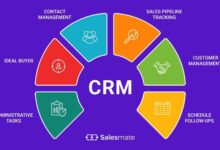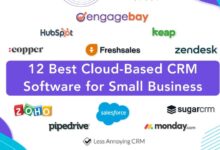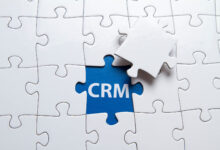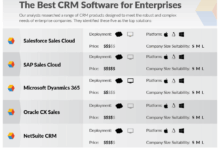Affordable CRM Software for Startups
Affordable CRM Software for Startups is crucial for early-stage businesses navigating limited budgets. This guide explores how startups can find and implement cost-effective CRM solutions without sacrificing essential features. We’ll delve into defining “affordable” in the context of startup resources, examining key features, comparing popular options, and addressing integration, implementation, and scalability concerns. Understanding these factors will empower startups to select a CRM system that fosters growth without breaking the bank.
The following sections provide a detailed analysis of pricing models, essential features, software comparisons, integration capabilities, implementation processes, scalability considerations, and a practical use case. By the end, you’ll have a clear understanding of how to choose the right affordable CRM to support your startup’s journey.
Defining “Affordable” for Startups
Affordability in CRM software for startups is a relative term, heavily influenced by the company’s size, stage of development, and overall budget. What constitutes “affordable” for a bootstrapped operation with a few employees will differ significantly from what a seed-funded startup with rapid growth might consider. Understanding this nuance is crucial in selecting the right CRM solution.
Defining affordability goes beyond simply looking at the monthly or annual subscription fee. Hidden costs, such as implementation time, employee training, and necessary integrations with other business tools, can significantly impact the total cost of ownership. A seemingly cheap CRM with complex implementation and extensive training needs could ultimately prove more expensive than a slightly pricier option that’s easier to adopt and use.
Budget Considerations for Startup CRM Software
Startups typically operate on tight budgets. For monthly CRM subscriptions, a reasonable range would be $0-$500 per month, depending on the number of users and desired features. This translates to an annual budget of $0-$6000. The lower end might be suitable for solopreneurs or very small teams using a free or extremely basic CRM, while the higher end could accommodate a growing team with more sophisticated needs. Many CRMs offer tiered pricing, allowing startups to scale their spending as they grow. However, it is important to note that many CRMs have a pricing structure that scales with the number of users, therefore accurate budgeting is crucial.
Factors Influencing Affordability Beyond Pricing
Beyond the direct cost of the software license, several other factors significantly influence the overall affordability of a CRM for startups. Implementation costs, encompassing the time spent setting up the system, customizing it to fit the company’s specific workflow, and migrating data from existing systems, can be substantial. Employee training is another key consideration. A user-friendly interface and readily available training resources can minimize the time and cost associated with bringing employees up to speed. Finally, integrations are vital for a seamless workflow. The need to integrate the CRM with other business tools, such as email marketing platforms, accounting software, and project management systems, can add to the overall cost and complexity. Choosing a CRM with robust integration capabilities and readily available APIs can help reduce this overhead.
Pricing Comparison of Popular CRM Options
| Software Name | Pricing Tier | Features | Monthly Cost (USD) |
|---|---|---|---|
| HubSpot CRM | Free | Contact management, deal tracking, basic reporting | $0 |
| Zoho CRM | Standard | Contact management, deal tracking, sales automation, basic reporting, mobile access | $14 |
| Salesforce Sales Cloud | Essentials | Comprehensive CRM functionalities, advanced reporting and analytics, extensive customization options | $25 |
| Freshsales | Growth | Sales automation, lead management, contact management, detailed reporting and analytics, integrations | $49 |
Essential Features for Startups
Choosing the right CRM is crucial for a startup’s success. A well-chosen system streamlines operations, improves customer relationships, and ultimately drives growth. However, early-stage businesses often operate on tight budgets, making the selection process even more critical. This section outlines the essential features every affordable CRM should offer.
Early-stage businesses need a CRM that provides core functionality without unnecessary complexity or expense. Balancing essential features with advanced functionalities is key to finding the right fit. While advanced features like predictive analytics and sophisticated automation can be beneficial, they are often less critical in the initial stages of a company’s growth. Prioritizing the core functionalities will ensure a strong foundation for scaling later.
Top Five Must-Have CRM Features for Startups
The following five features form the bedrock of a successful CRM implementation for startups. These core functionalities provide the essential tools for managing customer interactions, tracking progress, and driving sales.
- Contact Management: A robust contact management system allows you to store and organize all customer information in a central location. This includes contact details, communication history, and interaction notes. Efficient contact management streamlines communication and prevents information silos.
- Lead Management: This feature helps track potential customers from initial contact to conversion. Lead management includes tools for scoring leads based on their potential value, assigning leads to sales representatives, and monitoring the progress of each lead through the sales pipeline. This helps prioritize efforts and improve conversion rates.
- Sales Pipeline Management: Visualizing the sales pipeline provides a clear overview of the sales process. This allows for easy tracking of deals at each stage, identification of bottlenecks, and proactive intervention to close deals more efficiently. This feature is crucial for monitoring sales performance and forecasting revenue.
- Reporting and Analytics: Basic reporting and analytics capabilities are essential for monitoring key performance indicators (KPIs). This allows startups to track sales progress, identify areas for improvement, and measure the effectiveness of their sales and marketing efforts. Simple dashboards visualizing key metrics provide valuable insights into business performance.
- Communication Tools: Integrated communication tools, such as email integration and possibly basic call logging, streamline communication with customers. This ensures consistent messaging and allows for efficient follow-up, fostering stronger customer relationships.
Trade-offs Between Essential and Advanced Features in Affordable CRM Options
Affordable CRM options often prioritize essential features over advanced functionalities. This is a strategic decision, acknowledging that startups typically need core functionalities first and can add advanced features as they grow and their budget expands. For example, an affordable CRM might offer basic reporting but not sophisticated predictive analytics or AI-powered lead scoring. This trade-off allows startups to access essential CRM capabilities without incurring unnecessary costs. The focus remains on building a solid foundation for managing customer interactions and driving sales.
Benefits of Essential Features for Startup Growth
The benefits of these essential features are directly tied to improved efficiency and growth.
- Improved Customer Relationships: Centralized contact information and communication history allows for personalized interactions, leading to stronger customer relationships and increased loyalty.
- Increased Sales Efficiency: Lead and sales pipeline management tools streamline the sales process, leading to faster deal closure and increased revenue.
- Data-Driven Decision Making: Basic reporting and analytics provide valuable insights into business performance, enabling data-driven decisions to optimize sales and marketing strategies.
- Enhanced Team Collaboration: Centralized information improves team collaboration and communication, ensuring everyone is on the same page and working towards common goals.
- Scalability and Flexibility: Choosing a CRM with a scalable architecture allows the system to adapt to the company’s growth, avoiding the need for costly system migrations in the future.
CRM Software Options Comparison
Choosing the right CRM can significantly impact a startup’s growth. This section compares three affordable options, highlighting their strengths and weaknesses to help you make an informed decision. We’ll focus on scalability, ease of use, and integration capabilities, crucial factors for startups experiencing rapid change.
Affordable CRM Software Comparison
The following table compares HubSpot CRM, Zoho CRM, and Pipedrive, three popular choices for startups. Each offers a free plan or a very affordable paid option, making them suitable for businesses with limited budgets. The ideal choice depends on your specific needs and priorities.
| Software Name | Strengths | Weaknesses | Best Use Case |
|---|---|---|---|
| HubSpot CRM | Free plan with robust features; excellent marketing automation tools; strong reporting and analytics; extensive integrations with other HubSpot tools and third-party apps; user-friendly interface. | Can become complex for very small teams; some advanced features require paid upgrades; the free plan lacks certain functionalities available in paid versions. | Startups focused on inbound marketing and sales, needing a comprehensive, integrated system. Ideal for those already using other HubSpot products. |
| Zoho CRM | Highly affordable pricing; extensive feature set across various plans; good scalability; strong customization options; offers a wide range of integrations. | Steeper learning curve compared to HubSpot; interface can feel cluttered for some users; managing complex workflows might require significant configuration. | Startups requiring a highly customizable and scalable solution with a wide array of features at a budget-friendly price. Suitable for businesses needing robust automation and workflow capabilities. |
| Pipedrive | Intuitive and user-friendly interface; strong focus on sales pipeline management; excellent for sales teams; easy to learn and implement; offers solid integrations. | Limited marketing automation features compared to HubSpot; fewer customization options than Zoho; reporting and analytics capabilities are less comprehensive than some competitors. | Startups primarily focused on sales and needing a straightforward, easy-to-use CRM to manage their sales pipeline efficiently. Best suited for smaller sales teams. |
Integration Capabilities
Seamless integration with other business tools is crucial for startups leveraging affordable CRM software. Effective data flow between systems streamlines workflows, minimizes manual data entry, and ultimately boosts efficiency and productivity. This section explores the importance of integration and provides examples of successful integrations.
The ability of your CRM to communicate with other software platforms significantly impacts your operational efficiency. A well-integrated system allows for automatic data synchronization, reducing the risk of human error and saving valuable time that can be better spent on core business activities. This is particularly important for startups with limited resources and personnel.
Successful Integrations: Examples
Several affordable CRM platforms offer robust integration capabilities. For instance, many integrate with popular email marketing platforms like Mailchimp or Constant Contact. This allows for automated email campaigns triggered by CRM events, such as a new lead or a customer’s purchase. Another common integration is with accounting software like Xero or QuickBooks. This facilitates automated invoice generation, payment tracking, and revenue reporting directly from customer data within the CRM. Furthermore, integrations with project management tools like Asana or Trello help streamline task assignment and progress tracking based on customer interactions and project milestones managed within the CRM.
Importance of Seamless Data Flow
Seamless data flow between a CRM and other business tools is essential for maximizing startup efficiency. Imagine a scenario where a sales team uses a CRM to track leads, but the marketing team uses a separate email marketing platform without integration. This creates a fragmented view of the customer journey, leading to inconsistencies in messaging and potentially missed opportunities. A seamless integration, on the other hand, ensures that all departments have access to a unified, real-time view of customer interactions and data. This allows for more effective collaboration, targeted marketing campaigns, and improved customer service. For example, a marketing campaign could be automatically triggered based on customer behavior tracked in the CRM, leading to increased conversion rates.
Data Flow Flowchart
The following flowchart illustrates a typical data flow between a CRM and other essential startup tools:
[Imagine a flowchart here. The flowchart would start with a “Lead” entering the CRM. Arrows would then show data flowing to: (1) Email Marketing platform (for automated email sequences based on lead status), (2) Accounting software (for invoice generation and payment tracking upon conversion to customer), and (3) Project Management tool (for task assignment related to onboarding or service delivery). Arrows would also show data flowing *back* to the CRM from these platforms, such as email open rates, payment statuses, and project completion updates. The overall visual representation would highlight the circular and interconnected nature of the data flow, emphasizing the seamless integration between the systems.]
Implementation and Training
Implementing affordable CRM software doesn’t have to be a daunting task, especially for startups with limited resources. The process is generally straightforward and can be completed efficiently with a focus on the core functionalities needed. A well-planned implementation, coupled with effective training, ensures a smooth transition and maximizes the software’s benefits.
The typical implementation process for affordable CRM software involves several key stages, from initial setup and data migration to user training and ongoing support. The complexity of each stage depends heavily on the chosen software, the size of the startup, and the existing data infrastructure. However, a phased approach allows for manageable implementation and minimizes disruption to daily operations.
CRM System Setup for a Startup
Setting up a basic CRM system involves several key steps. First, you need to define your requirements. This includes identifying the essential features needed (contact management, lead tracking, sales pipeline management, etc.) and the number of users. Next, choose a suitable affordable CRM software. Consider factors like ease of use, integration capabilities, and pricing.
- Import Existing Data: Transfer relevant data from spreadsheets or other systems into the new CRM. This might involve manual entry for smaller datasets or using data import tools provided by the software. Accuracy is crucial; data cleansing before import can significantly improve efficiency.
- Customize Fields and Workflows: Tailor the CRM to your specific business processes. This might involve adding custom fields to track unique information relevant to your industry or creating automated workflows to streamline tasks like lead assignment or follow-up emails. A well-configured workflow ensures team members are always informed of critical tasks.
- Configure Integrations: Connect the CRM to other essential business tools, such as email marketing platforms, accounting software, or social media management tools. This integration creates a centralized hub for all customer-related data, improving efficiency and reducing data silos.
- User Role Assignment and Permissions: Assign appropriate roles and permissions to each user to ensure data security and control access to sensitive information. Restrict access based on individual roles and responsibilities. For instance, sales representatives might have access to lead information, while marketing personnel may only have access to campaign data.
- Test and Refine: Before full deployment, thoroughly test the system to ensure all features work as expected and that the data is accurate. Identify and address any issues before rolling out the system to the entire team. This prevents potential problems down the line.
Effective Training Methods
Effective training is crucial for maximizing the return on investment in CRM software. A well-trained team can leverage the system’s features to improve efficiency and productivity. Training should be tailored to the specific needs of the startup team, focusing on practical application rather than abstract concepts.
- Hands-on Workshops: Conduct interactive workshops where team members can work through real-life scenarios using the CRM software. This allows for immediate feedback and addresses specific questions in a practical setting.
- Online Tutorials and Resources: Provide access to online tutorials, videos, and documentation to allow team members to learn at their own pace and revisit materials as needed. Many affordable CRM providers offer extensive online resources.
- Mentorship and Peer Support: Assign experienced team members as mentors to help guide new users. This fosters a collaborative learning environment and allows for quick resolution of issues. Encourage team members to help each other.
- Regular Check-ins and Feedback Sessions: Schedule regular check-in sessions to monitor user adoption and gather feedback. Address any challenges or concerns promptly and adjust training methods as needed. This ensures continuous improvement in system utilization.
Scalability and Future Growth
Choosing a CRM that fits your current needs is crucial, but equally important is selecting one that can adapt and expand alongside your startup’s growth. Investing in a system that quickly becomes inadequate as your business scales can lead to wasted resources and operational inefficiencies. Therefore, scalability should be a primary consideration when evaluating affordable CRM options.
Understanding the factors influencing long-term CRM scalability helps startups make informed decisions. This involves considering not just the software’s capabilities, but also your projected growth trajectory, budget flexibility, and technical expertise. A solution that’s perfectly affordable now might become a significant constraint as your user base, data volume, and operational complexity increase.
Factors Affecting CRM Scalability
Several key factors determine a CRM’s ability to support your startup’s growth. These factors influence both the technical capabilities of the system and the overall cost-effectiveness of scaling it.
- User Capacity: The maximum number of users the system can support without performance degradation is a critical factor. Consider your projected team size in the next 1-3 years and choose a CRM with sufficient user licenses. Many systems offer tiered pricing based on user numbers, so this should be carefully considered.
- Data Storage Capacity: As your business grows, so does the amount of customer data you collect. Ensure the CRM offers sufficient storage capacity to accommodate this growth, or has options for easy expansion (such as cloud-based storage with flexible upgrade options). Running out of storage can severely impact performance and data accessibility.
- System Performance: The speed and efficiency of the CRM are crucial, especially as data volumes increase. A slow, unresponsive system can significantly hinder productivity. Look for systems that are known for their performance under load, or that offer performance guarantees based on user numbers and data volume.
- API and Integration Capabilities: As your business expands, you may need to integrate your CRM with other essential tools (e.g., marketing automation, e-commerce platforms). Robust API capabilities are vital for seamless integration and efficient data flow across different systems. A limited API might severely restrict your scalability options.
- Customization Options: The ability to customize workflows, reports, and dashboards is important for adapting the CRM to your evolving business processes. A highly customizable system can better accommodate the complexities of a larger, more diverse organization.
CRM Upgrade Scenario: From Startup to SME
Imagine “InnovateTech,” a startup initially using a basic, affordable CRM like HubSpot’s free plan to manage its small customer base. As InnovateTech expands, adding sales representatives and marketing automation, the free plan’s limitations become apparent. The user limit is reached, and reporting capabilities are insufficient for tracking sales performance across multiple teams.
InnovateTech upgrades to HubSpot’s Professional plan, gaining access to increased user capacity, more advanced features (like sales forecasting and marketing automation tools), and better reporting dashboards. This allows InnovateTech to effectively manage its growing sales team and track marketing campaign effectiveness. Further growth might necessitate another upgrade to the Enterprise plan, offering even more sophisticated features and customization options to support its larger scale and more complex business processes. This planned, phased approach ensures the CRM remains a valuable asset throughout InnovateTech’s expansion.
Illustrative Example
Let’s consider “BloomBoost,” a fictional startup specializing in organic gardening supplies delivered directly to customers’ doorsteps. BloomBoost is experiencing rapid growth but struggles to manage its burgeoning customer base and sales leads effectively. Their current system involves spreadsheets and email, leading to inefficiencies and lost opportunities.
BloomBoost needs a CRM solution to streamline its operations, improve customer relationships, and facilitate scalable growth. An affordable CRM system would allow them to centralize customer information, track sales leads, manage marketing campaigns, and automate communication.
BloomBoost’s CRM Needs and HubSpot’s Solution
BloomBoost’s primary needs include contact management, lead tracking, sales pipeline visualization, and basic marketing automation. HubSpot’s free CRM plan offers these features and integrates well with other essential tools. The affordable pricing makes it an ideal solution for a bootstrapped startup like BloomBoost.
Workflow Improvement with HubSpot
Imagine the BloomBoost team using HubSpot. Previously, customer details were scattered across multiple spreadsheets. Now, all customer information—contact details, purchase history, communication logs, and even social media interactions—resides in a single, centralized database. Sales leads, once tracked manually, are now automatically logged and categorized within HubSpot’s pipeline visualization tool. This provides a clear, real-time view of the sales funnel, enabling BloomBoost to identify bottlenecks and prioritize high-potential leads. Marketing campaigns, formerly managed through disparate email platforms, are now integrated within HubSpot, allowing for targeted email marketing and automated follow-up sequences. The visual representation would be a clean, intuitive dashboard showing a clear progression of leads through the sales pipeline, color-coded for different stages (e.g., lead, prospect, customer). Sales team members can see at a glance which leads require attention and which are progressing smoothly. Key performance indicators (KPIs) such as conversion rates and sales cycle length are readily available, providing data-driven insights for improvement. Reports can be easily generated to track marketing campaign effectiveness and sales performance. The overall visual effect is one of clarity, efficiency, and control, drastically improving BloomBoost’s ability to manage its growing customer base and drive sales.
Last Word
Selecting the right affordable CRM software is a pivotal decision for any startup. By carefully considering the factors discussed – budget constraints, essential features, integration needs, scalability, and implementation – startups can confidently choose a solution that aligns with their current needs and future growth aspirations. Remember, a well-chosen CRM isn’t just a cost; it’s an investment in efficiency, organization, and ultimately, success.





